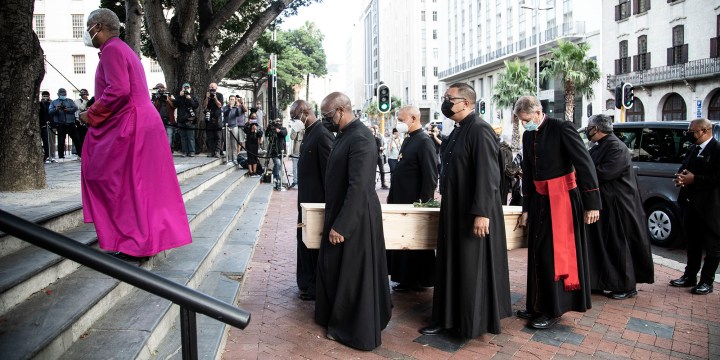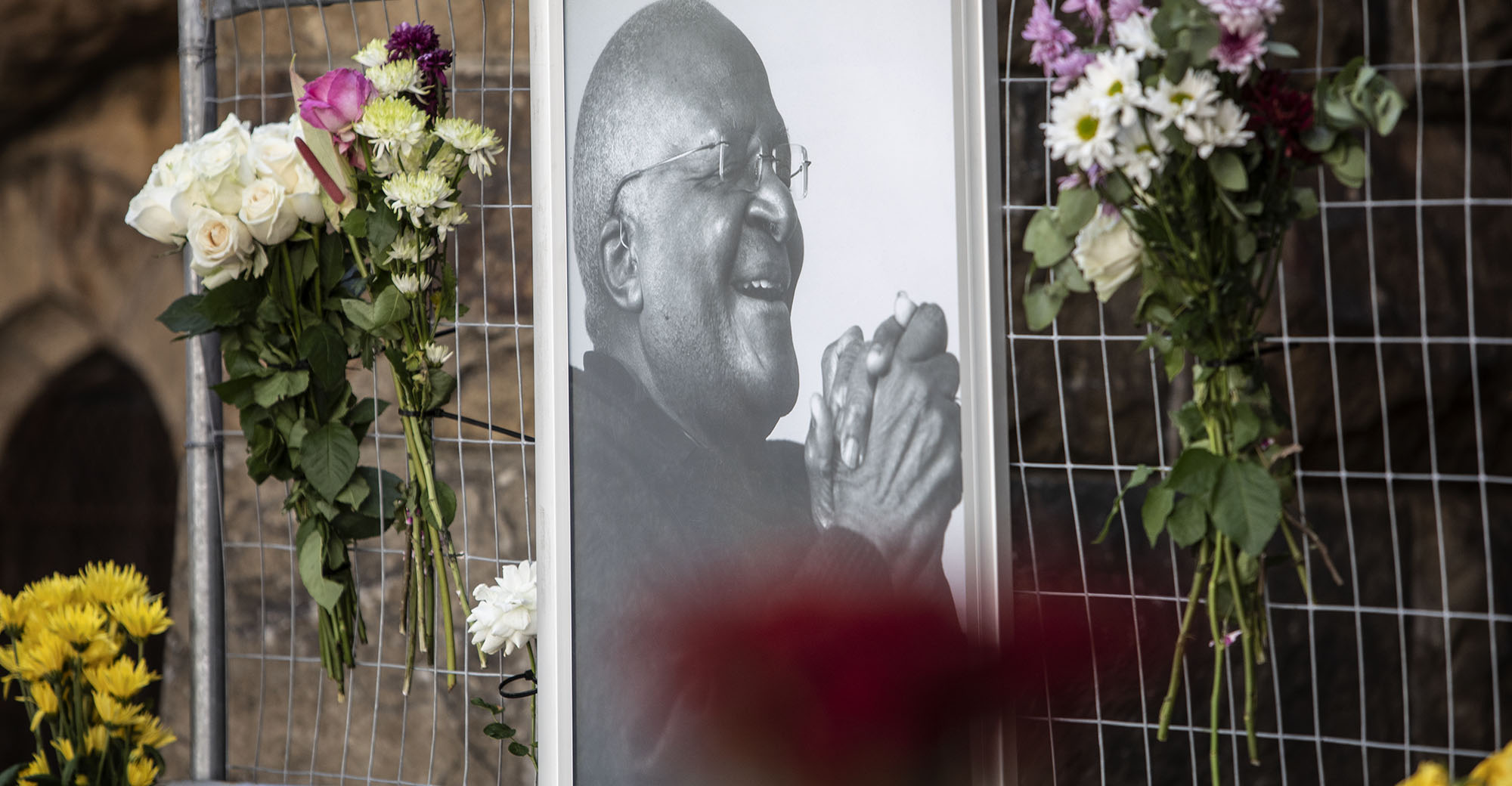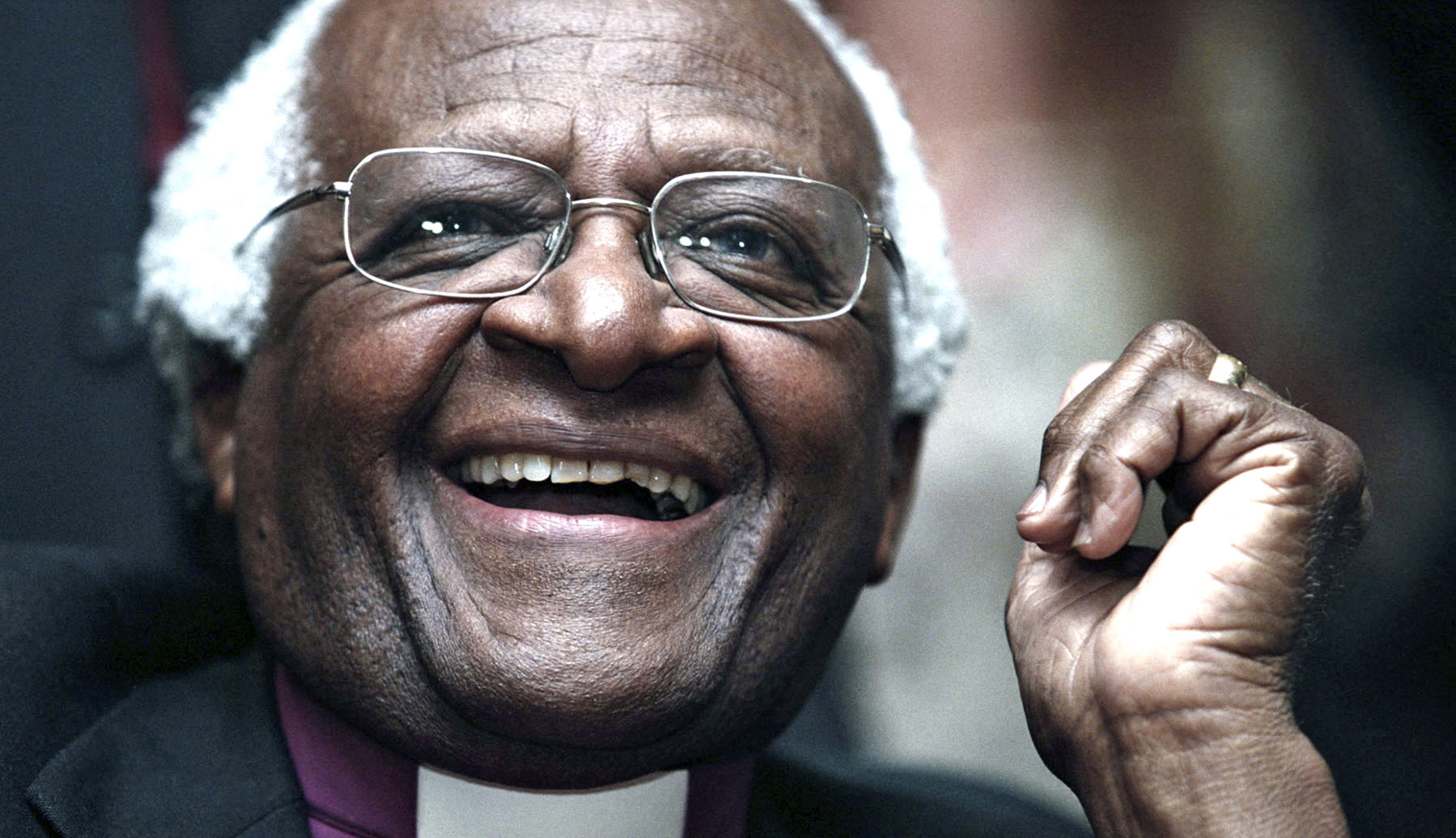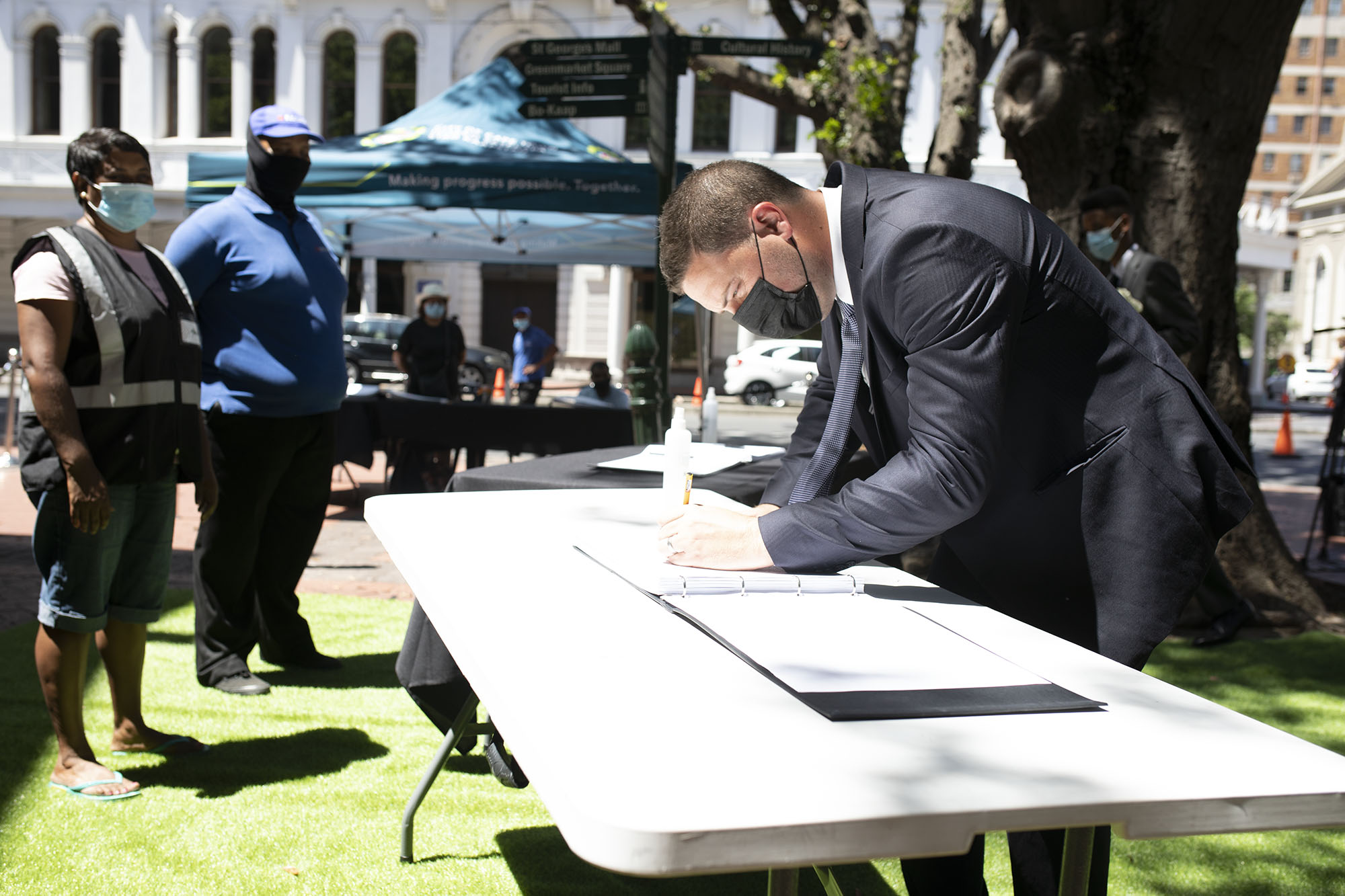DESMOND MPILO TUTU (7 OCTOBER 1931 – 26 DECEMBER 2021)
Mighty beacon of hope and unity – gone but legacy lives on in the people he touched

Ahead of Archbishop Desmond Tutu’s funeral, scheduled to take place on Saturday at St George’s Cathedral in Cape Town, Daily Maverick spoke to a few of the late icon’s esteemed colleagues and admirers. What emerged was a loving portrait of a humble man dedicated to freedom and dismantling inequality, and a legacy that now becomes South Africa’s to bear and continue.

A photograph of the late Archbishop Emeritus Desmond Tutu is displayed outside St George’s Cathedral in Cape Town, South Africa, on Sunday, 26 December 2021. (Photo: Leila Dougan)
‘He seems to have been there all my adult life’– Mary Robinson
Former first woman president of the Republic of Ireland, Mary Robinson, was one of many distinguished attendees at the commemorative event for the late Archbishop Desmond Tutu, hosted at the Desmond and Leah Tutu Legacy Foundation. Robinson, who described becoming involved in the anti-apartheid movement as a student under the tutelage of Professor Kader Asmal, worked with Tutu intimately as original members of The Elders, an elite international organisation founded by former South African president, Nelson Mandela.
“I can’t actually remember when I first met Tutu, because he seems to have been there all my adult life,” said Robinson fondly. She described bearing witness to Tutu’s commitment to The Elders, and his ability to fully absorb the meaning of ubuntu. “He spoke about that quite a lot,” she said. For Robinson, Tutu was defined as a voice for justice, human rights, the forgotten, and those most excluded and discriminated against. More than anything, his ability to find hope has stuck with her.
She recalls a panel discussion she was part of with Tutu in New York: “He was accused of being an optimist, and he said, ‘Oh no, I’m not an optimist, I’m a prisoner of hope’.”
According to Robinson, this particular remark gave her lifelong hope. “It’s only if you have hope that you have the strength and the oxygen to fight discrimination, to fight inequality, to fight injustice,” she said. “I always associate Tutu with bringing hope to the world – inspiration.”
Another distinguished guest at the event was former first lady of both Mozambique and South Africa, Graça Machel, who – in her keynote address – urged all those listening to make a pledge of some kind to better themselves in the name of social justice and Tutu’s legacy. For Robinson, this pledge is quite serious. “I’ve got to think about that,” she said with optimism.
‘It was like visiting great grandparents’ – Zelda la Grange
Zelda la Grange, former personal assistant to the late Nelson Mandela came to know Tutu very well through working for Madiba, and through being neighbours with the Tutu family in the Overstrand.
“It was just good to have them around; it was like visiting great grandparents,” reminisced La Grange. She described the Arch as a mentor to her, and a spiritual guide with whom she would often pray.
After the death of Nelson Mandela, the Arch was controversially not invited to his former friend’s funeral. For La Grange, this is still a very sensitive issue. “I made a point to go to the Arch to say to him how much he is loved and appreciated, because I felt that is what I can do to honour Madiba.” Tutu was one of only 10 people invited to Madiba’s wedding, she recalled. “How would you not acknowledge him?”
La Grange emphasised that doing something to rectify this was important for her, because Tutu was a beloved friend and brother in the fight against apartheid to Mandela. “I’m still a little bitter about it, but I wanted to make my side right, because I felt like I failed him, to make sure he knew he was loved.”
‘When someone like Desmond Tutu goes, he doesn’t really disappear’ – Nomfundo Walaza
Nomfundo Walaza, the former CEO of the Desmond Tutu Peace Centre, now known as the Desmond and Leah Tutu Legacy Foundation, worked with Tutu very closely for seven years. She was integral to the effort of preserving his legacy and subsequently raising funds for the new archives detailing Tutu’s life that will be unveiled at the Foundation, at the Old Granary Building in Cape Town.
For Walaza, “it has been a bit of a rough year” marked by many losses in 2020 and 2021. “But also, when I look at his legacy and look at what he’s left us, there’s also a sense that I’m so lucky to be a South African,” she countered with a smile. “I’m so lucky to be part of the people who were touched by him and who learnt a lot from his lessons.”

16 April 2004. Johannesburg, South Africa. Archbishop Desmond Tutu attended the honorary ceremony Kagiso Trust held for South African anti-apartheid activist Beyers Naude at Kagiso House. (Photo: Joyrene Kramer / Gallo Images)
She described him as a normal person, but also a priest, a teacher, a courageous man, a man of prayer, a man who loved and practised justice, and a man of his word. “I don’t know how we’re going to do without him, but I do believe he has left us with so much, we cannot complain,” she said, emphasising his consistency in the work he did. “He did his best. He gave us his life.”
The youth were a significant part of Tutu’s vision for the nation’s future, according to Walaza, who recalled his preaching that the children would inherit the earth.
“I think part of what he was looking for was that the younger generation will take the baton and carry on the work that he has done. So I think there’s no excuse for all of us.”
She went on to describe this work as a legacy of passing on the mission for equality intergenerationally.
In Machel’s words, Desmond Tutu represented the last of a particular generation of freedom fighters for many, and as such many South Africans may feel lost and uncertain of our future. For Walaza, there is no need to be afraid. “I’m touched by the notion that when someone like Desmond Tutu goes, he doesn’t really disappear. So I don’t think we should be afraid, he is with us.”
Walaza took comfort in a few anecdotes from her time with the Arch. “I remember one day he called me and said, ‘Sisi, you are now my boss’,” she said with a chuckle. “I thought that was so strange and said, ‘No Tata, I can’t be your boss’.”
It is this idiosyncratic humour that set his politics apart. “His humour was always, for me, done in such a way that it was him communicating the difficult stuff in a roundabout way. In a way that was political. In a way that you could always remember what he had said. Because if you laugh at something, it’s a lesson that you’ll never forget,” explained Walaza.
To sustain his legacy and be a leader of Tutu’s magnitude, Walaza believes we need only emulate his light and values. “All you have to do is the simple things that he did, that got him to be who he is.”
‘I celebrate him for many reasons, definitely as a gay South African’ – Marc Lottering
For South African stand-up comedian Marc Lottering, the memorial service held at Cape Town’s City Hall on Wednesday was a great opportunity to “send the arch off in style” and celebrate him.
“I celebrate him for many reasons, definitely as a gay South African,” said Lottering, who added that the ways in which the Arch made him smile were even more reason to celebrate him.
Memories of the many comedy festivals that the Arch would attend came to mind for Lottering, who said that Tutu would come up on the stage and “the audience would go crazy”. He recalls how riled up everyone backstage would get, “because you can’t top that act”.
For Lottering, it is this sense of humour that he will miss. “He loved telling jokes, laughing, but mostly laughing at his own jokes,” he said. “I thought I can take that from him; we should be able to do that a whole lot more.”
The Arch’s habit of beginning sermons with jokes inspired Lottering to start his own sermons “by cracking a few wise jokes as well … in the same tradition”.
‘He said we were so brainwashed as African people’ – Shaykh Ebrahim Gabriels
Former president of the Muslim Judicial Council and current director of the Al-Quds Foundation for the Liberation of Palestine, Shaykh Ebrahim Gabriels, noted that the political struggle to free Palestine was one the Arch was very much in support of.
He remembers one function where Tutu spoke of the prejudices that mentally enslave the African people, and how we are indoctrinated to think of Africa as behind and backwards. “He said we were so brainwashed as African people.”
Gabriels then used his own reflective anecdote of one occasion where he had anxiety about flying with Ghana Airlines for the first time, to articulate this as a lesson he learnt from the Arch.
The memorial service was an interfaith-based event, which saw members from all religious backgrounds in attendance, something that Gabriels believes aligned with Tutu’s values. “This is Cape Town. Cape Town is known for interfaith,” he said. “We live together as Muslims, Jews, Christians, Hindus, everybody. And I think that’s the beauty of Cape Town especially.”
‘I think that part of his appeal, is that it could really cut both ways’ – Geordin Hill-Lewis
While the current Mayor of Cape Town, Geordin Hill-Lewis, never actually had the opportunity to meet the late Arch personally, he was certainly greatly influenced by him.
Earlier in the week, the mayor told Daily Maverick that just a week before his passing, current archbishop of Cape Town, Archbishop Thabo Makgoba, gave him a note from Tutu of good wishes and prayer. Archbishop Makgoba was going to see the Arch every day to pray with him and hold private service with him, according to Hill-Lewis.

Cape Town Mayor Geordin Hill-Lewis writes in a book of condolences for Archbishop Desmond Tutu (Photo: Leila Dougan)
For the Mayor, Tutu’s humour and wit were essential to his work. “[That’s] what was so characteristic about him, and what made him both so charming and also so deadly effective if you were on the wrong side of it.”
Hill-Lewis recalls Tutu’s famous phrase, “I’ll pray for you”: “You never really knew. Did that mean you were so bad that you needed prayer or that he genuinely meant to help you,” he said smiling, as the City Hall’s bells began chiming the tune of the National Anthem. “And I think that part of his appeal, is that it could really cut both ways. He was just a wonderful man.”
‘The Arch is a beacon, not only for South Africa but also the world’ – Denay Willie
Denay Willie, the co-founder of the Rainbow Academy for underprivileged children, named in honour of the Arch and Mandela, was in attendance at the memorial. While her interactions with the Arch were limited during his life, she feels nonetheless moved by his legacy.
“He touched my life and the lives of generations of young people, and has inspired the lives of so many young people … to build this country post the era of Nelson Mandela and the great stalwarts that established this country and democracy,” said Willie.
For Willie, Tutu represented an unparalleled love for humanity. “The Arch is a beacon, not only for South Africa but also the world, and I think that South Africa can truly be proud of one of its greatest leaders and sons of the earth for all time,” she said, tears visibly welling in her eyes. “He represents what we all aspire to be as human beings. I haven’t seen a greater love for people and love for God in my life.”
Willie explained that she is a firm believer in the individuality of people and their equality despite those differences, and for her, the Arch exemplified this. “I so admire that about the Arch; he is who he is.”
‘I think he did unite South Africa in many ways’ – Beverley van Reenen and Desiree Visagie
Mayoral committee member for energy and climate change at the City of Cape Town, Beverely van Reenen, elaborated on the Arch’s unique style of politics.
“If you marry the humour with this peace that he wanted to bring about, it was just amazing bringing a nation together,” she declared. Van Reenen described Tutu as “a legend” who will be fondly remembered for “that chuckle that he had”.
Chief Whip in the City of Cape Town, Desiree Visagie, echoed Van Reenen’s sentiments. “I think that he did unite South Africa in many ways. He was a very fair person. He always said the right thing, and moreover he did the right thing,” said Visagie. “In that sense of humour he was actually very serious as well, but that is how he actually brought his message about.”
‘The Arch could take a serious moment and would laugh from his belly’ – Marlene le Roux
“We used to laugh and we used to dance together,” recalled Marlene le Roux, a disability and women’s rights activist, and CEO of the Artscape Theatre in Cape Town. Le Roux told Daily Maverick that as a woman of colour who came from a past era of student activists, she knows the Arch as “a laughing person” despite the adversity and seriousness of those times.
Le Roux noted that Tutu was a big supporter of the Artscape Women’s Humanity Arts Festival, and was unpretentious in his approach to the importance of the arts. “We used to look at people who took the arts so seriously … and we used to laugh about it, because we had this saying that everybody needs to go to the toilet,” she said with a laugh. “It was how the Arch was.” The Arch was also a big supporter of the Tygerberg Hospital Children’s Trust, according to Le Roux, “because he was for children”.
“We must not just have all the Arch’s seriousness, because the Arch was serious, but the Arch could take a serious moment and would laugh from his belly, and that I will never ever forget,” she said, finding light in the loss. “Whatever happens, you need to have the ability to laugh at yourself, for yourself. Not at others. That is what I will take with me through my whole life.”
Le Roux also highlighted the importance of Tutu’s work for the emancipation of women and the queer community, suggesting that the church is still grappling with these communities. It was here that she invoked the Arch’s words of not believing in a homophobic God.
“There was this stunned moment of silence at this gathering, and Arch was just very clear, and he wanted to make a point,” described Le Roux, who went on to argue that people are still afraid to say that we are all equal in the eyes of God, and that this was what the Arch had the courage to do.
For Le Roux, the values of sharing and equality are fundamental beliefs of hers. “The Arch taught me to walk in that path.” DM

















 Become an Insider
Become an Insider
Comments - Please login in order to comment.